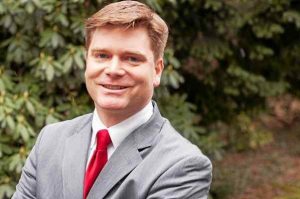Democrat would use his experience to bring people together
By Mike McGann, Editor, The Times

Marty Malloy
Marty Malloy says he sees a Harrisburg that doesn’t work and needs a new, more inclusive approach and that as a state Senator, he’d be able to bring his experiences in the non-profit world of bringing disparate communities together to find common ground, and help to get things moving again in the state capital.
Malloy, a Democrat from Nether Providence and a Conestoga High School graduate, is seeking to win next Tuesday’s special election to replace Dominic Pileggi as state Senator for the 9th District. He faces Republican Tom Killion, currently a State Representative. Both are also on the ballot as primary candidates for the seat for the November general election, as well.
Malloy makes it clear all of his differences with Killion are policy based and in no way personal — but the two disagree on a wide range of issues from raising the state’s minimum wage to abortion to school funding to the Mariner East 2 pipeline, which will give voters something of a stark choice on April 26.
“You will not hear me say one thing negative about Tom Killion’s character,” Malloy said during a recent interview in the Delaware County Democratic Office in Media. “I just disagree with him on a number of issues.”
Malloy said that that vilifying the opposition — something that has gone on in both parties — is part of the current problem in terms of a stalemate in the legislature and that he thinks it is counterproductive.
He notes that there are many Republicans who may agree with many Democrats on one issue here or one issue there, and they need to brought into a true bipartisan process in developing new legislation — whereas in recent years a large number of bills have been given party-line votes, as one or the other party advanced them without much consultation with the other — although he cited the recent medical marijuana bill as a wonderful example of legislators on both sides of the aisle working together to push through a bill that has wide public support.
If elected, he said, he’d work to foster more of that sort of collaboration amongst his colleagues in the Senate.
Malloy points to his professional history — where he had to work with groups that often opposed his organizations point of view. By bringing them into the process, he said he was able to make their point of view heard. Many went from opponents to supporters in the process.
He led a struggling non-profit, Greater Philadelphia Cares as its Executive Director and worked to keep its programs running while working through a sustaining merger with the United Way of Greater Philadelphia and Southern New Jersey. That, he notes, led to the creation of Community Action Center, which is still having an impact non-profits throughout the region.
Currently, he serves as Director of Vocational Programming for the YouthBuild Charter School in Philadelphia.
That work in the non-profit world (YouthBuild is a not-for-profit charter school), Malloy says has taught him to learn to work across boundaries and find areas of common interest. He said that he thinks that skill would be put to good use in Harrisburg, where both cross-party and intraparty rivalries and disputes have ground down the legislative process and led to massive retirements and departures in recent years, incuding Sen. Dominic Pileggi — the former Majority Leader, who was forced out of his position by more conservative elements in the Republican Party, and ultimately chose to leave the state Senate to become a Judge of the Court of Common Pleas in Delaware County.
But, he allows, there are some policy differences. As an example, the Mariner 2 East pipeline has been a source of both contentious dispute — between concerns about how eminent domain is used to force landowners to sell right of ways to concerns about the environmental impact of the pipeline — and Malloy said he questions whether it makes sense either for the state or the district. Supporters, though, argue that having the pipeline move gas and other petrochemicals to a port and refinery in Delaware County will mean a big boost in jobs and local economic development, in both Chester and Delaware counties.
“I believe very strongly that there should be an energy hub in the district,” he said. “But that it should be solar and wind based.”
Malloy said he’d rather see investment in renewable energy production in places like Marcus Hook than in building a pipeline for oil products — especially as prices worldwide have collapsed, and it is unclear whether any investments will ultimately be recouped by taxpayers. He remains in favor of an extraction tax for the Marcellus Shale gas and oil extraction, he notes, knowing that fossil fuel production will continue to be part of the state’s energy production for many years to come.
As an extraction tax won’t be a big part of solving the state’s fiscal crisis, he argues that bigger, broader actions are needed in the long term, including revising the state Constitution to allow for a progressive income tax.
In the shorter term — and Malloy acknowledges a fight for a progressive income tax could take a long time — the state needs to seriously look at revenue, as additional cuts are going to be difficult and likely will be counter productive to long-term economic growth for the state.
He said that legislators are going to have move off stances that eliminate any new revenue or taxes — and that ultimately, more state funding for eduction has to be found.
He notes that much of the current issue with local real estate taxes — in many large local tax hikes — are the direct result of Republicans in Harrisburg looking to avoid raising taxes on the state level and cutting school funding over the past generation. It’s created a nasty cycle, as urban schools were weakened, local real estate values dropped, as families moved out, further worsening urban school district’s financial issues, weakening them further, and leading to a vicious cycle that leaves urban districts stripped of real estate value, sparked sprawl in suburban and rural districts (and the higher taxes and bond issues required to build new schools for ballooning student populations).
“When you look at it,” he said, “it all comes back to education.”
Mallow argues that the state needs to return to funding 50% of the cost of education as it did in the 1980s — depending on sourcing, the current number falls between 31% and 36%.
In terms of other issues, Malloy makes it clear he is strongly pro-choice and said he strong disagreed with the current bill in the House of Representatives that would limit abortion to the first 20 weeks and outlaw some abortion procedures.
Malloy said he supports common sense gun control — including universal background checks, mandated reporting of stolen weapons, and restrictions for those who have active restraining orders.




